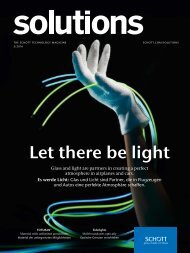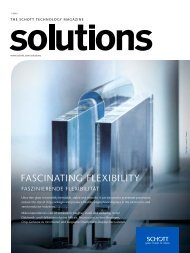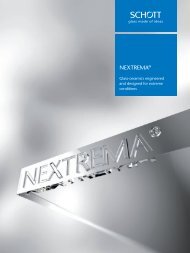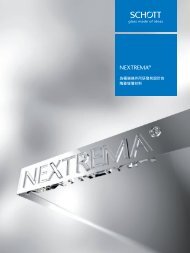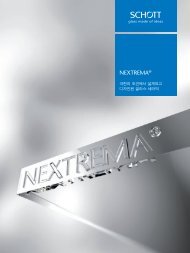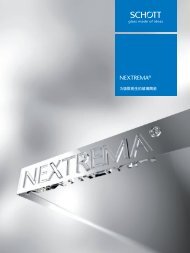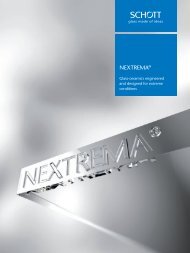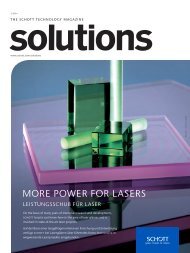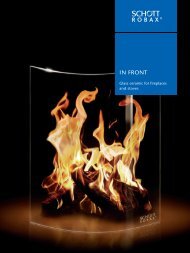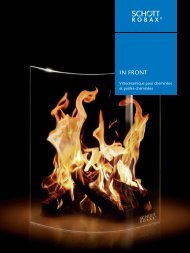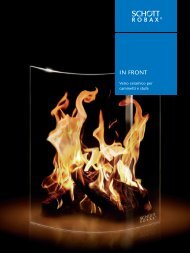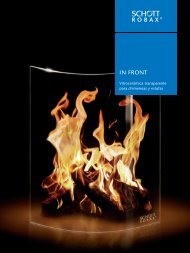SCHOTT Technical Glasses
Apart from its application in optics, glass as a technical material has exerted a formative influence on the development of important technological fields such as chemistry, pharmaceutics, automotive, optics, optoelectronics and information technology. SCHOTT Technical Glasses offers pertinent information in concise form. It contains general information for the determination and evaluation of important glass properties and also informs about specific chemical and physical characteristics and possible applications of the commercial technical glasses produced by SCHOTT. With this brochure, we hope to assist scientists, engineers, and designers in making the appropriate choice and make optimum use of SCHOTT products.
Apart from its application in optics, glass as a technical material has exerted a formative influence on the development of important technological fields such as chemistry, pharmaceutics, automotive, optics, optoelectronics and information technology. SCHOTT Technical Glasses offers pertinent information in concise form. It contains general information for the determination and evaluation of important glass properties and also informs about specific chemical and physical characteristics and possible applications of the commercial technical glasses produced by SCHOTT. With this brochure, we hope to assist scientists, engineers, and designers in making the appropriate choice and make optimum use of SCHOTT products.
You also want an ePaper? Increase the reach of your titles
YUMPU automatically turns print PDFs into web optimized ePapers that Google loves.
57<br />
Leadcontaining<br />
Type<br />
Main<br />
applications<br />
α (20/300)<br />
10 –6 /K<br />
T g<br />
°C<br />
Pb<br />
contents<br />
wt%<br />
Firing<br />
temp.<br />
°C<br />
Holding<br />
time<br />
min.<br />
G018-205 Pb-Zn-B sinter glass diodes 4.45 541 1– 5 690 10 – –<br />
G017-388 Zn-B-Si composite<br />
thyristors, highblocking<br />
rectifiers<br />
3.6 550 1– 5 700 5 180 ≥ 30<br />
G017-002 Zn-B-Si composite sintered glass diodes 3.7 545 1– 5 700 10 180 –<br />
G017-096R<br />
Pb-B-Si<br />
sinter glass, planarand<br />
mesa-diodes<br />
4.8 456 10 – 50 680 5 160 –<br />
G017-004 Pb-B-Si composite mesa diodes 4.1 440 10 – 50 740 5 160 ≥ 30<br />
G017-230 Pb-B-Si composite transistors 4.2 440 10 – 50 700 4 160 ≥ 25<br />
G017-725 Pb-B-Si sinter glass diodes 4.9 468 10 – 50 670 10 180 –<br />
G017-997 Pb-B-Si composite wafer passivation 4.4 485 10 – 50 760 20 180 –<br />
G018-133 Pb-B-Si composite sinter glass diodes 4.8 463 10 – 50 690 30 – –<br />
T j<br />
°C<br />
Layer<br />
thickness<br />
µm<br />
Lead-free<br />
G018-200 Zn-B-Si sinter glass diodes 4.6 557 – 665 10 – –<br />
G018-197 Zn-B-Si sinter glass diodes 4.4 557 – 675 10 – –<br />
G018-255 Bi-Zn-B varistors 9.4 396 – 520 15 – –<br />
Table 17. <strong>SCHOTT</strong> passivation glasses<br />
Heavy metals which are incompatible with semicon ductors<br />
are controlled as well. The CuO content, for example, is below<br />
10 ppm.<br />
Because the mobility of charge carriers increases drastically<br />
with increasing temperature, a temperature limit, called<br />
junction temperature T j , is defined up to which glass-passivated<br />
components can be used in blocking operations.<br />
Forms of supply<br />
Passivation glasses are supplied as glass powders, ground<br />
iron-free and with negligible abrasion. Passivation glasses<br />
are available as tubing or sleeves for use in certain applications.<br />
They are available in various grain sizes (generally<br />
type K, see Table 17) to suit the respective application.<br />
In manufacturing, glass passivation is often followed by<br />
chemical processes (such as etching of contact windows or<br />
electrolytic deposition of contacts) which may attack the<br />
glass. The chemical resistance of the various passivation<br />
glasses differs strongly and is an important criteria in selecting<br />
the appropriate glass type. Zinc-borosilicate glasses, for<br />
instance, are highly sensitive to chemical attack by acids<br />
and alkaline solutions and therefore only recommended for<br />
use with contacts applied by sputtering.<br />
9




